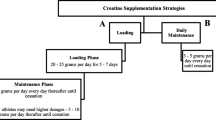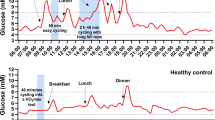Abstract
Laboratory-based studies have demonstrated that adding protein (PRO) to a carbohydrate (CHO) supplement can improve thermoregulatory capacity, exercise performance and recovery. However, no study has investigated these effects in a competitive sporting context. This study assessed the effects of combined CHO–PRO supplementation on physiological responses and exercise performance during 8 days of strenuous competition in a hot environment. Twenty-eight cyclists participating in the TransAlp mountain bike race were randomly assigned to fitness-matched placebo (PLA 76 g L−1 CHO) or CHO–PRO (18 g L−1 PRO, 72 g L−1 CHO) groups. Participants were given enough supplements to allow ad libitum consumption. Physiological and anthropometric variables were recorded pre- and post-exercise. Body mass decreased significantly from race stage 1 to 8 in the PLA group (−0.75 ± 0.22 kg, P = 0.01) but did not change in the CHO–PRO group (0.42 ± 0.42 kg, P = 0.35). Creatine kinase concentration and muscle soreness were substantially elevated during the race, but were not different between groups (P = 0.82, P = 0.44, respectively). Urine osmolality was significantly higher in the CHO–PRO versus the PLA group (P = 0.04) and the rise in tympanic temperature from pre- to post-exercise was significantly less in CHO–PRO versus PLA (P = 0.01). The CHO–PRO group also completed the 8 stages significantly quicker than the PLA group (2,277 ± 127 vs. 2,592 ± 68 min, respectively, P = 0.02). CHO–PRO supplementation therefore appears to prevent body mass loss, enhance thermoregulatory capacity and improve competitive exercise performance despite no effect on muscle damage.







Similar content being viewed by others
References
Åstrand PO, Ryhming I (1954) Nomogram for calculation of aerobic capacity from pulse rate during submaximal work. J Appl Physiol 7:218–221
Below PR, Mora-Rodriguez R, González-Alonso J, Coyle E (1995) Fluid and carbohydrate ingestion independently improve performance during 1 h of intense exercise. Med Sci Sports Exerc 27:200–210
Berardi JM, Noreen EE, Lemon PWR (2008) Recovery from a cycling time trial is enhanced with carbohydrate–protein supplementation vs. isoenergetic carbohydrate supplementation. J Int Soc Sports Nutr 5:24–34
Burke LM, Keins B, Ivy JL (2004) Carbohydrate and fat for training and recovery. J Sports Sci 22:15–30
Carrithers JA, Williamson DL, Gallagher PM, Goddard MP, Shulze KE, Trappe SW (2000) Effects of postexercise carbohydrate–protein feedings on muscle glycogen restoration. J Appl Physiol 88:1976–1982
Carter J, Jeukendrup AE, Mundel T, Jones DA (2003) Carbohydrate supplementation improves moderate and high-intensity exercise in the heat. Pflugers Arch 446:211–219
Cockburn E, Hayes PR, French DN, Stevenson E, St Clair Gibson A (2008) Acute milk-based protein–CHO supplementation attenuates exercise-induced muscle damage. Appl Physiol Nutr Metab 33:775–783
Coggan AR, Coyle EF (1987) Reversal of fatigue during prolonged exercise by carbohydrate infusion or ingestion. J Appl Physiol 63:2388–2395
Colombani P, Kovacs P, Frey P, Langhans W, Arnold M, Wenk C (1999) Metabolic effects of a protein-supplemented carbohydrate drink in marathon runners. Int J Sports Med 9:181–201
Convertino VA, Brock PJ, Keil LC, Bernauer EM, Greenleaf JE (1980) Exercise training-induced hypervolemia: role of plasma albumin, renin and vasopressin. J Appl Physiol 48:665–669
Coyle EF, Coggan AR, Hemmert MK, Ivy JL (1983) Carbohydrate feeding during prolonged strenuous exercise can delay fatigue. J Appl Physiol 55:230–235
Coyle EF, Coggan AR, Hemmert MK, Ivy JL (1986) Muscle glycogen utilization during prolonged strenuous exercise when fed carbohydrate. J Appl Physiol 61:165–172
Dangin M, Boirie Y, Garcia-Rodenas C, Fauquant J, Callier P, Ballevre O, Beaufrere B (2001) The digestion rate of protein is an independent regulating factor of postprandial protein retention. Am J Physiol Endocrinol Metab 280:E340–E348
Davis JM, Burgess WA, Slentz CA, Bartoli WP, Pate RR (1988) Effects of ingesting 6% and 12% glucose/electrolyte beverages during prolonged intermittent cycling in the heat. Eur J Appl Physiol Occup Physiol 57:563–569
Deschamps A, Levy RD, Cosio MG, Marliss EB, Magder S (1992) Tympanic temperature should not be used to assess exercise induced hyperthermia. Clin J Sport Med 2:27–32
Easton C, Fudge BW, Pitsiladis YP (2007) Rectal, telemetry pill and tympanic membrane thermometry during exercise heat stress. J Therm Biol 32:78–86
Febbraio MA, Murton P, Selig SE, Clark SA, Lambert DL, Angus DJ, Carey MF (1996) Effect of CHO ingestion on exercise metabolism and performance in different ambient temperatures. Med Sci Sports Exerc 28:1380–1387
Febbraio MA, Chiu A, Angus DJ, Arkinstall MJ, Hawley JA (2000) Effects of carbohydrate ingestion before and during exercise on glucose kinetics and performance. J Appl Physiol 89:2220–2226
Fielding RA, Costill DL, Fink WJ, King DS, Hargreaves M, Kovaleski JE (1985) Effect of carbohydrate feeding frequencies and dosage on muscle glycogen use during exercise. Med Sci Sports Exerc 17:472–476
Goto M, Kamijo Y, Okazaki K, Masuki S, Miyagawa K, Nose H (2007) Protein and carbohydrate supplementation during 5-day aerobic training enhanced improvement of thermoregulation in young men. FASEB J 21:A1296
Grant SM, Green HJ, Phillips SM, Sutton JR (1997) Effects of acute expansion of plasma volume on cardiovascular and thermal function during prolonged exercise. Eur J Appl Physiol Occup Physiol 76:356–362
Ivy JL, Goforth HW Jr, Damon BM, McCauley TR, Parsons EC, Price TB (2002) Early postexercise muscle glycogen recovery is enhanced with a carbohydrate–protein supplement. J Appl Physiol 93:1337–1344
Ivy JL, Res PT, Sprague RC, Widzer MO (2003) Effect of a carbohydrate–protein supplement on endurance performance during exercise of varying intensity. Int J Sports Nutr Exerc Metab 13:382–395
Jeukendrup A, Brouns F, Wagenmakers AJ, Saris WH (1997) Carbohydrate-electrolyte feedings improve 1 h time trial cycling performance. Int J Sports Med 18:125–129
Jeukendrup A, Craig NP, Hawley JA (2000) The bioenergetics of world class cycling. J Sci Med Sport 3:414–433
Luetkemeier MJ, Thomas EL (1994) Hypervolemia and cycling time trial performance. Med Sci Sports Exerc 26:503–509
Maughan RJ, Leiper JB (1995) Sodium intake and post-exercise rehydration in man. Eur J Appl Physiol Occup Physiol 71:311–319
Maughan RJ, Leiper JB, Vist GE (2004) Gastric emptying and fluid availability after ingestion of glucose and soy protein hydrolysate solutions in man. Exp Phys 89:101–108
Millard-Stafford M, Starling PB, Rosskopf LB, Hinson BT, Dicarlo LJ (1990) Carbohydrate-electrolyte replacement during a simulated triathlon in the heat. Med Sci Sports Exerc 22:621–628
Millard-Stafford ML, Starling PB, Rosskopf LB, Dicarlo LJ (1992) Carbohydrate-electrolyte replacement improves distance running performance in the heat. Med Sci Sports Exerc 24:934–940
Millard-Stafford ML, Warren GL, Thomas LM, Doyle AJ, Snow T, Hitchcock KM (2005) Recovery from run training: efficacy of a carbohydrate–protein beverage? Int J Sports Nutr Ex Metab 15:610–624
Mitchell JB, Costill DL, Houmard JA, Fink WJ, Pascoe DD, Pearson DR (1989) Influence of carbohydrate dosage on exercise performance and glycogen metabolism. J Appl Physiol 67:1843–1849
Okazaki K et al (2009) Impact of protein and carbohydrate supplementation on plasma volume expansion and thermoregulatory adaptation by aerobic training in older men. J Appl Physiol 107:725–733
Pitsiladis YP, Smith I, Maughan RJ (1999) Increased fat availability enhances the capacity of trained individuals to perform prolonged exercise. Med Sci Sports Exerc 31:1570–1579
Reed MJ, Brozinick JT, Lee MC, Ivy JL (1989) Muscle glycogen storage postexercise: effect of mode of carbohydrate administration. J Appl Physiol 66:720–726
Romano-Ely B, Kent-Todd M, Saunders MJ, St. Laurent T (2006) Effect of an isocaloric carbohydrate–protein-antioxidant drink on cycling performance. Med Sci Sports Exerc 38:1608–1616
Saunders MJ, Kane MD, Kent-Todd M (2004) Effects of a carbohydrate–protein beverage on cycling endurance and muscle damage. Med Sci Sports Exer 36:1233–1238
Saunders MJ, Luden ND, Herrick JE (2007) Consumption of an oral carbohydrate–protein gel improves cycling endurance and prevents postexercise muscle damage. J Strength Cond Res 21:678–684
Saunders MJ, Moore RW, Kies AK, Luden ND, Pratt CA (2009) Carbohydrate and protein hydrolysate coingestion’s improvement of late-exercise time-trial performance. Int J Sports Nutr Ex Metab 19:136–149
Toone RJ, Betts JA (2010) Isocaloric carbohydrate versus carbohydrate–protein ingestion and cycling time-trial performance. Int J Sports Nutr Exerc Metab 20:34–43
Tsintzas OK, Williams C, Wilson W, Burrin J (1996) Influence of carbohydrate supplementation early in exercise on endurance running capacity. Med Sci Sports Exerc 28:1373–1379
van Essen M, Gibala MJ (2006) Failure of protein to improve time trial performance when added to a sports drink. Med Sci Sports Exerc 38:1476–1483
Van Hall G, Shirreffs SM, Calbet JA (2000) Muscle glycogen resynthesis during recovery from exercise: no effet of additional protein ingestion. J Appl Physiol 88:1631–1636
Whitley HA, Humphreys SM, Campbell IT, Keegan MA, Jayanetti TD, Sperry DA, MacLaren DP, Reilly T, Frayn KN (1998) Metabolic and performance responses during endurance exercise after high-fat and high-carbohydrate meals. J Appl Physiol 85:418–424
Williams MB, Raven PB, Fogt DL, Ivy JL (2003) Effects of recovery beverages on glycogen restoration and endurance exercise performance. J Strength Cond Res 17:12–19
Wirnitzer KC, Kornexl E (2008) Exercise intensity during an 8-day mountain bike marathon race. Eur J Appl Physiol 104:999–1005
Zawadzki KM, Yaspelkis BB III, Ivy JL (1992) Carbohydrate–protein complex increases the rate of muscle glycogen storage after exercise. J Appl Physiol 72:1854–1859
Acknowledgments
This study was supported in part by High5 Ltd, UK.
Author information
Authors and Affiliations
Corresponding author
Additional information
Communicated by Jacques R. Poortmans.
This paper is dedicated to the memory of Dr Andy Cathcart, who was tragically killed in a cycling accident prior to the submission of this manuscript. He will be sorely missed by his colleagues, the students he taught, and his family and friends.
Rights and permissions
About this article
Cite this article
Cathcart, A.J., Murgatroyd, S.R., McNab, A. et al. Combined carbohydrate–protein supplementation improves competitive endurance exercise performance in the heat. Eur J Appl Physiol 111, 2051–2061 (2011). https://doi.org/10.1007/s00421-011-1831-5
Received:
Accepted:
Published:
Issue Date:
DOI: https://doi.org/10.1007/s00421-011-1831-5




